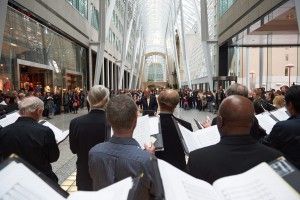Looking Ahead with Noel and Cynthia
We sat down with Artistic Director Noel Edison and Executive Director Cynthia Hawkins to talk about artistic excellence and how the TMC as an organization can maintain its hard-earned excellence in a changing arts landscape.
What does it mean to be “excellent,” artistically speaking, when we look at the future?
NOEL: Anything of excellence is ongoing—it simply never stops. It’s made up of who comes in, what their background is. We maintain it by keeping those in the choir vocally and rhythmically alert.
There’s an old saying that you either tour or record. Touring is challenging, because the TMC is a lot of humanity to move. However, there are opportunities to hook up with choirs in the Eastern US or in Canada for some sort of sharing experience. So, long-term, it’s important to record a broad spectrum of music, with orchestra and choir, so that we can document this choir. Not a self-produced recording but on the NAXOS label, so that it can reach an international market.
I’m also very interested in our sponsoring some sort of mini weekend workshop for young choristers—those who are right out of high school—with the TMC.
Finally, it’s important for the TMC to be involved in other musical activities in the city—either self-produced or as guests of other artists, as we have with Barbra Streisand and Andrea Bocelli, and in appearances at Luminato. The TMC is the city’s choir—it’s important for us to be involved in more than just our own music.

CYNTHIA: Administratively, in the office, we’re there to support the artistic side. Moving forward, I would like to see us reaching a wider audience in a different way, so that more people are familiar with the brand. Following the success of the pop-up concerts, it seems like it would be good to move the choir around more, and have us perform in different venues.
We’ve reached a really high level this year. We’ve been able to successfully marry venues, programmes, and the sound of the choir in a way that we’ve been working towards for a long time.
Just in terms of ticket sales, it’s been an amazingly successful year, and we definitely want to build on that success—to keep in touch with the people who attended our concerts this year and entice them back.
What are the challenges the Choir faces as we move into 2015-16 and beyond.
NOEL: The greatest challenge is of course finding new sources of money. We need to maintain our current sources of funding, of course, but find significant new dollars if we’re to do anything new.
CYNTHIA: It’s a Catch-22—certain programs generate revenue, in terms of ticket sales. But we need capital to launch new programs and stay artistically relevant.
A challenge is that in the broader arts community, the choral art form is seen as volunteer-based and, frankly, not that good. (Which is not true). Hopefully the exposure gained from touring and recording helps to address that.
Of all the choral organizations in the city, we are the only on that is not purely professional to receive the level of public funding that we receive. This is a testament to the quality of the artistic product we produce. Corporations, however, just don’t see us in the same way that they see the professional organizations.
Other than money, the challenge is how can we build on this year’s artistic and performing success. We’re working to identify what we can do to present our concerts o more than one night. The market for classical music is small—if we only offer one option, than some audience members don’t even have a chance to hear us. This is a big step, so it might be more of a five-year plan than something we just jump into.
Let’s talk about relevance. The TMC’s product has a pretty impressive pedigree, but the arts scene in Toronto and Canada is changing rapidly. How do we ensure that the artistic product we produce stays relevant in a society whose cultural values are changing rapidly?
CYNTHIA: When we look at the question we have to look strategically at why we do something. We work really hard to put people in seats, but selling tickets shouldn’t be the main focus of what we perform. Symphonic choral works are what we do, and the TMC has a specific mandate to present these works. Programming with the sole goal of selling tickets runs the risk of not living up to our mandate.
In terms of programming, I certainly don’t think we should be changing what we do to attract other, different, audiences.
NOEL: We tried that, in fact, and gained not one additional audience member.
What about changing how we present our music: looking for multi-media ways to present the music. That was a theme that emerged in some of the New Ears reviews.
NOEL: The Elora Festival Singers has certainly been hired to do live concerts and videos. I’m not sure the TMC could go that specific route, but there is probably something we could do.
CYNTHIA: This sort of thing could work, would have to be the right programme, the right venue, and the right experience. I love the idea of visuals, but I’m not sure what we would do.
NOEL: All great concerts are occasions. We’ve tapped into that, for example, with our Sacred Music, and Festival of Carols programmes. Each concert is an occasion and not just another thing in a series. It’s that sense of occasion that we need to capture.



